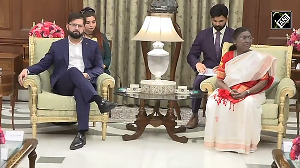
The Right to Information should not be limited to right to know but it should empower every citizen to question those in power, Prime Minister Narendra Modi said on Friday, as he urged that RTI applications be processed in a timely and transparent manner.
Addressing the inaugural session of 10th convocation of Central Information Commission, Modi said the foundation of democracy is that even the most ordinary citizen has the right to question the government.
"It is correct that in Right to Information even most common person has the right to know. But it should not limited to that. He should have the right to question those in power and this is the foundation of democracy," Modi said.
He stressed on "proactively" bringing transparency in the working of the governemnt saying the faster "we move towards transparency", the stronger will be the faith of people in democracy.
"The awareness of people gives strength to government and not only government, an aware society becomes an asset to the nation...," he said.
The prime minister said the process of accessing information should be transparent, timely and trouble-free.
"Delayed information does not help solve the problem but increases it. Timely information can halt a wrong decision. We will emphasise this," he said.
Highlighting the ambitious Digital India programme, the prime minister said the scheme is complementary to the spirit of RTI as the more things become online, the more transparency comes in.
He also stressed that RTI should be used to bring improvement in governance.
"If a question is asked by a citizen, there must be some issue in government for which the need for question arose. A small RTI question can force you to change policy," he said.
He said there should be trust between the government and the people and it comes through transparency.
"Why can't we bring transparency proactively? Why should anyone make effort to get information? The effort of the government should be that citizen should get information easily," the prime minister said.
Talking about introduction of self-attestation of documents, the prime minister said "we have to trust people".
"Secrecy could have been the norm during old times but I don't think there is need of such secrecy now. Transparency brings in simplicity and speed in the working of the government," he said.
A group of activists boycotted the inaugural session claiming that a large number of them were barred from entry in the convention as authorities cited security reasons.
The prime minister said through RTI people can get information about the process but not the product like it can give details about tendering etc of an under-construction bridge but it cannot give details of its quality.
Modi said a detailed analysis of questions asked by people can underline shortcomings in governance which can be rectified by those in government.
"Only responding to RTI questions cannot bring change in governance. When we perfectly analyse questions and find shortcomings in governance...the questions of citizens can highlight these shortcomings of the system and we can find a way to correct them. RTI should be used as a medium for good governance," he said.
Underlining that people are paramount in a democracy, Modi said "government must give importance to every concern raised by a people's representative, whichever party he or she may belong to because he raises an issue of his constituency only because of public interest involved in this."
The prime minister rued that during proceedings in legislatures, answers remain media-centric and to settle scores. "What to do as it has become a compulsion," he said.
"RTI is a medium to achieve transparency and is also a learning system to bring transparency in systems. Government runs by public money and public is paramount in democracy," he said, adding that aim of RTI should be to bring positive change in government.
Earlier, speaking on the occasion, Finance Minister Arun Jaitley termed RTI Act as an "exemplary law" which has been "a very successful experience" as far as Indian society is concerned.
"It has transformed us during the last few decades and particularly in the last decade from a society that relished in secrecy," he said.
The finance minister said the administrators of RTI Act will have to use their discretion whether the Act is being used for empowerment, to avoid harassment, for the benefit of the common man or is it being used by busy bodies for collateral purpose.
Jaitley said the administrators will have to do a balancing act between "strengthening the exercise of this right and preventing possible abuse in the implementation of this particular legislation."
"...whatever be the evolution which takes place either by the virtue of case law being developed by superior courts or further improvements by legislative intervention, I think our wisdom will certainly prevail and this Act will certainly continue to grow and mature," he said.
The finance minister said every time a decision is taken, one of the constraints in the mind of the decision-maker is that there is a possibility that this decision would eventually become public. There is a further possibility that this decision would then be questioned and therefore the decision must speak out for its own case.
Jaitley also said the role of technology in furnishing information can make it cost-effective and "less time-consuming".
He said experience has taught us virtues of restraint and caution and "where a line can be drawn in public conduct and privacy".






 © 2025
© 2025